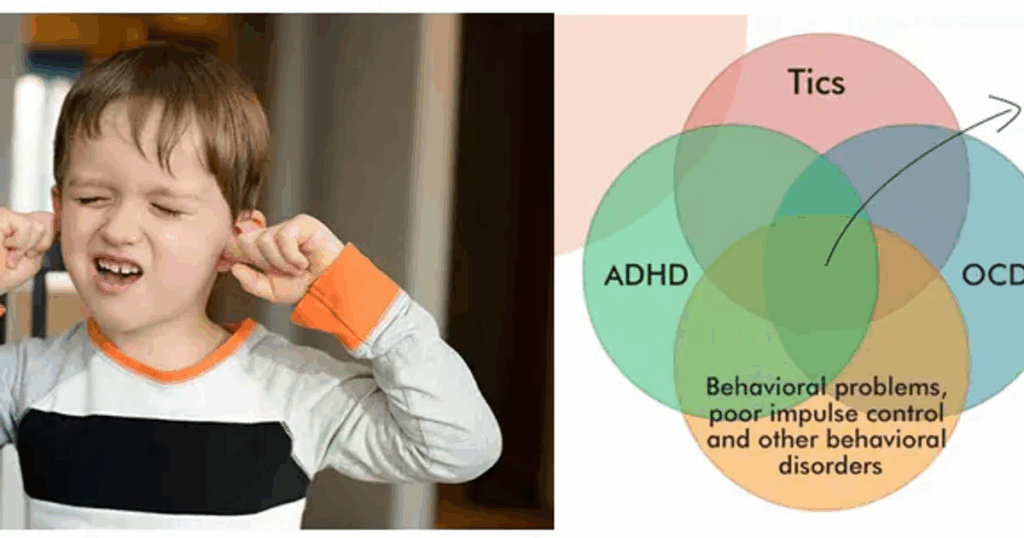If you’re searching for natural treatments for tics and Tourette’s PDF, you’re likely exploring gentle, complementary ways to manage tic symptoms beyond conventional medication. Tics and Tourette’s Syndrome (TS) can be challenging, but integrating natural approaches such as dietary adjustments, mind-body techniques, herbal supplements, and behavioral strategies may help reduce symptoms and improve quality of life.
This detailed guide will discuss scientifically supported natural therapies, explain how they work, and suggest practical, safe options for those with tics or TS. If you’re a parent, caregiver, or individual seeking alternatives or supplements to mainstream treatments, this article offers evidence-based insights and actionable advice.
What Are Tics and Tourette’s Syndrome?
Before diving into treatments, it helps to understand the condition.
- Tics are sudden, repetitive, involuntary movements or sounds—motor tics (e.g., blinking, head jerking) or vocal tics (e.g., throat clearing, grunting).
- Tourette’s Syndrome is a neurological disorder characterized by multiple motor tics and at least one vocal tic lasting more than one year, usually beginning in childhood.
Tics can vary in intensity and frequency and may worsen with stress or excitement.
Why Consider Natural Treatments for Tics and Tourette’s?
While medications and behavioral therapies remain the mainstays, many individuals seek natural or complementary approaches to:
- Reduce side effects from drugs
- Manage symptoms holistically
- Improve overall well-being
- Find additional relief when symptoms persist
Natural treatments often address lifestyle, nutrition, and mind-body balance, which can influence tic severity.
Natural Treatments for Tics and Tourette’s PDF: Evidence-Based Options

1. Behavioral Therapies and Mind-Body Medicine
Behavioral intervention is among the most effective non-pharmacologic approaches.
- Comprehensive Behavioral Intervention for Tics (CBIT) includes habit reversal training and awareness enhancement to reduce tic severity. It is widely recommended as first-line therapy.
- Mindfulness and Relaxation Techniques such as meditation, deep breathing, and yoga may reduce stress, which commonly exacerbates tics.
- Biofeedback trains individuals to control physiological responses, potentially decreasing tic frequency.
2. Dietary & Nutritional Supplements
Nutrition can influence neurological health and tic expression.
- Omega-3 Fatty Acids: Found in fish oil, nuts, and seeds, omega-3s have anti-inflammatory and neuroprotective properties. While some studies show modest benefits for tics, evidence is mixed but promising.
- Vitamin B6 and L-Theanine: Research suggests these supplements can decrease tic severity and co-occurring anxiety by supporting neurotransmitter regulation.
- Vitamin D: Maintaining optimal vitamin D levels might benefit children with tic disorders and help modulate neurological function.
- Herbal Formulations: Traditional Chinese Medicine (TCM) formulas such as Ningdong (ND) granules and Qufeng Zhidong Recipe (QZR) decoction have shown potential in clinical trials to reduce tic symptoms. They often contain herbs like Gastrodia elata with neuroprotective effects.
3. Physical Activity and Exercise
Regular physical activity can reduce tic severity by:
- Improving overall brain health and neurotransmitter balance
- Reducing anxiety and stress
- Enhancing motor control
Activities like swimming, walking, and tailored exercise regimens have been linked to improvements in tic management.
4. Acupuncture and Traditional Chinese Medicine (TCM)
- Acupuncture and TCM practices aim to balance the body’s energy (“Qi”) and modulate neurological functions.
- Some patients report symptom relief, but scientific evidence is evolving and limited by study sizes and designs.
5. Hypnosis and Relaxation Therapies
Hypnosis as part of mind–body medicine is emerging as a supportive treatment to decrease tic severity by reducing anxiety and facilitating control over tics.
How to Use Natural Treatments Safely
- Always consult a healthcare provider before starting supplements or new therapies, especially in children.
- Use verified supplements from reputable sources to ensure quality and safety.
- Combine natural treatments with conventional therapies for comprehensive care.
- Monitor symptom changes and side effects diligently.
Practical Examples: Building a Natural Tic Management Plan
Morning: Start with a breakfast rich in omega-3s (e.g., oatmeal with walnuts and flaxseeds). Practice 10 minutes of mindfulness meditation.
Afternoon: Engage in schooling or work with scheduled breaks incorporating deep breathing and gentle stretching.
Evening: Take vitamin B6 and L-Theanine supplements as advised. Enjoy a gentle walk or play an active game to reduce stress and improve motor skills.
Weekly: Attend behavioral therapy sessions and monitor tic frequency. Use relaxation techniques before bedtime.
Where to Find Reliable PDFs and Resources on Natural Treatments for Tics and Tourette’s
- Academic sources like Oxford Academic provide comprehensive chapters and reviews on alternative treatments.
- National Tourette Syndrome associations often have downloadable toolkits and guides.
- University neurology departments publish systematic reviews and clinical guidelines in PDF format.
Downloading and studying these PDFs can empower you with knowledge to discuss with your healthcare team.
Exploring the Gut-Brain Connection in Tics and Tourette’s Management
An emerging area in natural treatments for tics and Tourette’s involves understanding and supporting the gut-brain axis, the complex communication network between your digestive system and nervous system. Research suggests that imbalances in gut microbiota may influence neurological disorders, including tic severity.
How Gut Health Affects Neurological Function
- The gut produces neurotransmitters like serotonin and dopamine, critical in regulating mood and motor control.
- Inflammation or dysbiosis in the gut may exacerbate neural excitability linked to tics.
- A healthy gut environment supports immune regulation, reducing stress on the nervous system.
Strategies to Support Gut Health Naturally
- Probiotic-rich foods: Yogurt, kefir, sauerkraut, kimchi, and other fermented foods.
- Prebiotic fiber: Found in bananas, onions, garlic, and whole grains, these foods feed beneficial gut bacteria.
- Reducing processed food intake: Minimizes inflammation-promoting additives and preservatives.
- Hydration: Adequate water supports digestion and gut lining integrity.
Consulting with a nutritionist versed in neurological health may help tailor a gut-supportive diet that complements natural tic management.
Sleep Hygiene and Its Role in Tic Severity Reduction

Sleep disturbances often worsen tic disorders. Implementing good sleep hygiene can be a vital natural strategy to mitigate tic intensity.
Why Sleep Matters
- Poor sleep increases stress hormones, which can exacerbate tics.
- Restorative sleep supports brain processes that regulate motor control and emotional balance.
Tips for Better Sleep in Individuals with Tics
- Maintain a consistent sleep schedule even on weekends.
- Create a dark, quiet, and cool bedroom environment.
- Limit screen exposure 1-2 hours before bedtime to avoid blue light disruption.
- Incorporate calming pre-sleep routines such as reading or gentle stretching.
- Avoid stimulants like caffeine in the late afternoon and evening.
Improved sleep quality often correlates with noticeable reductions in tic frequency and severity.
Stress Management and Emotional Support in Natural Tic Treatment
Tics often worsen with stress and emotional upheaval. Thus, comprehensive natural tic management involves addressing mental health proactively.
Stress Reduction Techniques
- Progressive muscle relaxation: Helps reduce muscle tension and nervous system arousal.
- Guided imagery: Use visualization exercises to imagine peaceful scenes and calm the mind.
- Breathing exercises: Techniques like diaphragmatic breathing slow heart rate and calm anxiety.
- Journaling: Expressing feelings can reduce internal tension that may trigger tics.
Accessing Emotional Support
- Support groups (in-person or online) provide shared experiences and reduce feelings of isolation.
- Psychological counseling or coaching trained in tic disorders can offer coping strategies.
- Family education sessions improve understanding and foster a supportive environment.
Implementing stress management as part of a natural treatment plan strengthens resilience and empowers self-regulation.
The Role of Occupational and Speech Therapy in Supporting Natural Tic Management

Beyond direct tic reduction, functional therapies can improve life quality for individuals with Tourette’s.
Occupational Therapy (OT)
- Focuses on fine motor skills, sensory processing, and daily living activities.
- Techniques to accommodate or modify environments reduce tic triggers linked to sensory overload.
- OT can teach alternative behaviors or strategies to manage premonitory urges.
Speech Therapy
- Assists in managing vocal tics or speech disruptions like coprolalia or echolalia.
- Techniques include breath control, pacing speech, and relaxation exercises.
- Speech therapists collaborate with behavioral therapists for holistic care.
Integrating these therapies supports functional independence and emotional well-being while complementing natural tic treatments.
Exploring Neurofeedback as a Non-Invasive Natural Intervention
Neurofeedback is an emerging biofeedback technique that trains brainwave patterns to promote neurological balance, showing promise in tic reduction.
How Neurofeedback Works
- Sensors monitor brain activity in real-time.
- Patients receive positive feedback when their brainwaves shift toward desired patterns associated with calmness and focus.
- Over time, brain self-regulation improves, potentially reducing tic frequency and intensity.
Advantages and Considerations
- Non-invasive and medication-free
- May reduce co-occurring ADHD, anxiety, or impulsivity common in Tourette’s
- Requires multiple sessions and access to certified practitioners
While research is ongoing, neurofeedback offers a promising complement within natural treatment strategies.
Dietary Triggers and Natural Food-Based Modifications to Reduce Tics
Identifying and eliminating certain food sensitivities may lessen neuroinflammation linked to tic exacerbations.
Commonly Reported Dietary Triggers
- Artificial additives and preservatives (e.g., sodium benzoate, MSG)
- High sugar intake causing blood sugar fluctuations
- Gluten and dairy in sensitive individuals
Elimination Diet Approaches
- Systematic removal and reintroduction of suspect foods under professional supervision.
- Emphasis on whole, unprocessed foods to minimize exposure to additives.
Though individual responses vary, dietary modifications frequently complement other natural treatments by reducing systemic inflammation.
Conclusion
Searching for natural treatments for tics and Tourette’s PDF reflects a proactive step toward wellness. The integration of behavioral strategies, dietary supplements, mind-body practices, and traditional medicine offers promising support in managing symptoms. While research evolves, combining these approaches thoughtfully with professional care enhances outcomes and quality of life.
